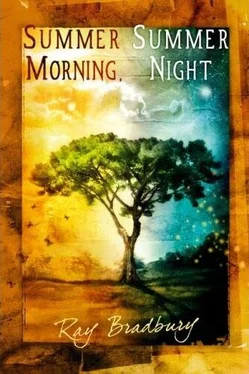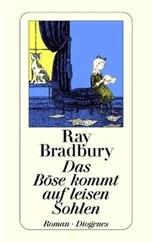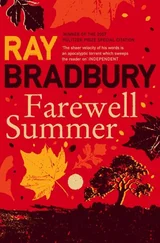At eight o’clock, Tom Spaulding came walking through the dusk to the edge of the meadow and stood breathing in the scents that blew from the summer grass in whispers.
“This is where it was,” he thought. “If only I could have come. If only I hadn’t had a cold and stayed in bed.”
He walked slowly to the center of the meadow. He stood sniffing, under the great chandelier of stars as all the blazing constellations caught fire and burned above him.
“Here’s where the lions were...”
The yellow smell, the smell of carpeting in sunlight, the smell of African dust, the smell of violent acid. A few quartz pebbles glittered in the dry grass like yellow animal eyes, and turned to stone once more as he bent down.
“Here’s where the elephants stood.”
The wind was large, towering above him, touching him with a cold, wrapping-around touch. The wind swayed back and forth, invisible. And the smell of the elephant was like a huge barn.
“Here’s where I’d have fed them.”
He picked up a few scattered peanut-shells, shoved them in his pocket after looking them over and over.
“And here’s where the monkeys were and the zebras and camels.” The dry bushes chattered in the wind. Summer lightning painted great luminous stripes upon the hills, soft, pale, and gone.
There hadn’t even been a circus parade. The lions had been silenced outside of town by the Lions inside of town. The elephants had been vanquished by the Elks. The calliope had been throttled and choked with red-tape and the entire circus assemblage, band, wagons, and clowns had fled before an Ark of Moose, Eagles and Oddfellows. The Kiwanis, reaching out its arm for its proverbial handshake, had had its knuckles slapped by Colonel Quartermain. Quartermain, Quartermain, the name was an unending repetition in the crowd of days, his face appeared in every window, on every street, he spoke from every monument on Memorial morning, he stood silent on Armistice Day facing East, he cried out from between the tar-black Civil War cannons on the Fourth of July. His eye was glittered at you from the clawing eagle’s head on the back of every dollar bill. His teeth smiled at you evilly in the store front cases of town dentists. His domed head glinted suggestively each time you opened the ice box and reached in for a fresh farm egg. He had fired off his mouth and sent the circus in panic to a forest beyond town. And passed a law preventing the employment of children therein when the poles were going up in the cold dawn light. Quartermain, Quartermain. Tom thought of him and knew the hatred that Douglas must know for the buzzard and the vulture and the snake.
“And here’s where the ring was and the man in the black silk hat saying, ‘Ladies ’n Gentlemen!’”
He stood at the exact center of the quiet meadow.
“And up there was where the men and ladies in pink cotton candy clothes swung on trapezes.”
Now the night wind whirled in a great merry-go-round about, stirring the odors, colors, sounds, tossing tin-cans fitfully in gusts through the grasses that swished like lions walking, and Tom staring at the sky through which papers flew and soared, dipping, to fly again. The whole meadow shook and quivered with the calliope wind and leaves spun in circles, the boy turning his hand out to them with an invisible whip. His eyes fixed the sky. Birds, crying, flew away.
The wind died.
Tom stood for only a minute longer, then his gaze dropped, his hands dropped. He walked across the meadow. He stood at its rim, and the numerous odors were richly ripened and might last, if savored carefully, if he didn’t come too often, until next year, until another late spring and summer. Even on winter nights, if you came here, if the wind was right, and the night not too full of moon, anything might happen.
“This is where it was, all right,” he said to himself.
And he walked away from the rich meadow, back into the summer night town.
THE CEMETERY ( or THE TOMBYARD )
IT HAD BECOME a familiar pattern by now. Every summer, on a certain July Sunday, they packed themselves into the open air Kissel and thundered out on quiet highways, down dirt roads and through woods to Green Ravine Rest, and here on every hand, as numerous as tenpins, lay relatives, aunts and cousins who had died at night, uncles who had died at high noon, fathers and mothers and sisters and brothers who had wanted to grow up to be firemen and nurses and now were nailed into packets and crossed with stones. And always, starting four years back, Charles had run off, alone, among the horrified stones, frozen at what they represented, and he would fumble his fingers over the chiselled names, reading, with eyes shut, in silent Braille, whispering the name he touched: “B, A, N, G, L, Le, y. Bangley! Died 1924.” And on and on, more names, more wanderings. And four years ago he had happened on this one stone building in the ravine, tried the door, found it open, and entered into silence. Oh, how frightened had the aunts been, and the cousins scurrying to find him. But he had waited until he felt like it and come out, not telling where he’d hid. Saying he had simply run off. It meant a licking, but it was worth it.
He would hear them calling, far off in the tomb ravine, among the summer butterflies and the green moss echoes, shouting down the long throat of the underground tunnel, standing by the solemn, reflecting creek, hands up to mouths, calling, calling for him. And he would giggle, stifling his laughter inside, like corking water into a jug. And he would run still further away from them, among the mushroom tombstones that grew up like bits of white cheese and moonstone in the shadows of the summer day. In this land of ravine silence, his feet pattered with the sound of rain along the soft paths of grass, and the further he ran, the more numerous the names on the stones became, Belton, Sears, Roller, Smith, Brown, Davis, Braden, Jones. Lackel, Nixon, Merton, Beddoes, Spaulding. A land of names and silences. And far far away his mother and his father and his aunts and his cousins calling his name:
“Charles, Charles, Charles, Charlie, Charles!”
He stopped when he reached his particular tomb building, slipped wide the door with the broken lock and hurried in. It was a tomb like a wedding cake, fancifully ornate, impossible and lovely. It had four windows facing the directions of the compass, looking out upon moss silence and weeping trees and fluttering water shelves that lowered themselves down a shadowed hill into the tunnel. Along the path now, like a string of white butterflies, flew the girl cousins, hair yellow on the air, eyes flashing.
“Charles, Charles, Charles, Charlie!”
And after them, more serious at the game than the children, came the tall aunts, their white skirts winging on the still air, panic making them begin to stumble and whirl about. “Charles!”
SIXTY SUMMERS burned the grass and sixty autumns plucked the trees to emptiness, and sixty winters froze the creek waters and cracked the toppling stones, while winds raced cold about, and sixty springs opened up new green meadows of color where butterflies were thick as flowers, and flowers as numerous as butterflies.
And then, one autumn afternoon, with the sky iron cold and the wind hurling tins of thunderous and invisible sound through the flying trees, an old woman edged along the path, peering here or there, alone, as delicate as chaff, as yellow as the last leaf.
She paused before the tomb building and nodded and sighed. She went to the long remembered window and peered in. Dust was thickened on the outside, and this she removed with her dainty flowered handkerchief, slowly and tremblingly.
And there was the small boy, leaned against the high sill, in the silent darkness, looking at her, looking out at silence and autumn hardness and the bare earth, and this old woman returned after so long. There was his head, like a dried fruit, and the fragile, timeworn arm and delicate fingers.
Читать дальше
Конец ознакомительного отрывка
Купить книгу










